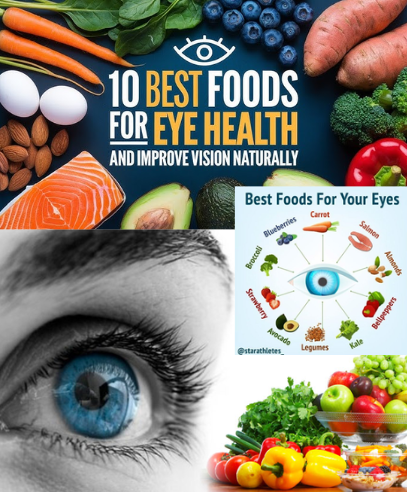
Your eyes are your window to the world, yet they’re often the last thing you think about when it comes to health. Many people focus on skincare, weight loss, or heart health—while completely forgetting that proper nutrition plays a huge role in maintaining good vision. The truth is, certain nutrients can protect your eyes from age-related damage, reduce the risk of diseases like cataracts and macular degeneration, and keep your vision sharp for years to come.
In this article, we’ll explore the top foods that are scientifically proven to benefit eye health, how they work, and how to easily include them in your daily meals.
Why Nutrition Matters for Your Eyes
Your eyes are complex organs that require specific vitamins and minerals to function properly. Over time, factors like aging, screen exposure, sun damage, and poor diet can lead to vision problems. However, eating a nutrient-rich diet can help protect your eyes in the same way sunscreen protects your skin.
Key nutrients for eye health include:
- Vitamin A
- Vitamin C
- Vitamin E
- Lutein and Zeaxanthin
- Omega-3 fatty acids
- Zinc
Let’s take a closer look at the best food sources of these nutrients and how they support your vision.
1. Carrots – The Classic Eye Food
You’ve probably heard that carrots are good for your eyes—and it’s true. Carrots are packed with beta-carotene, a form of vitamin A that helps your retina function properly and supports low-light vision. A deficiency in vitamin A can lead to night blindness and dry eyes.
How to eat them: Snack on raw baby carrots, add them to salads, or blend into a smoothie with ginger and orange juice.
2. Leafy Greens – Lutein and Zeaxanthin Powerhouses
Spinach, kale, and collard greens are loaded with lutein and zeaxanthin—two antioxidants that naturally accumulate in the retina and help filter harmful blue light. These nutrients are essential in preventing macular degeneration and reducing the risk of cataracts.
How to eat them: Sauté with garlic, add to soups, or blend into a green smoothie with banana and almond milk.
3. Eggs – Easy and Nutrient-Dense
Egg yolks contain both lutein and zeaxanthin, along with zinc, which helps your body absorb these antioxidants more effectively. They also contain vitamin A, making them a triple-threat food for your eyes.
How to eat them: Boiled, scrambled, or made into an omelet with veggies like spinach and tomatoes.
4. Fatty Fish – Omega-3s for Dry Eyes and Retina Support
Fish like salmon, sardines, mackerel, and tuna are rich in omega-3 fatty acids, which play a key role in retinal health. Omega-3s also help reduce inflammation and may prevent dry eyes caused by long hours in front of screens.
How to eat them: Grilled salmon, tuna salad, or fish tacos with avocado and lime.
5. Citrus Fruits – Vitamin C Boosters
Oranges, lemons, grapefruits, and limes are excellent sources of vitamin C, a powerful antioxidant that supports the health of blood vessels in the eyes. It also helps reduce the risk of developing cataracts.
How to eat them: Drink fresh-squeezed orange juice, add citrus segments to salads, or zest lemon over grilled veggies.
Video : Doctor explains BEST FOODS FOR EYE HEALTH AND VISION
6. Nuts and Seeds – Vitamin E and Omega-3 Combo
Almonds, walnuts, chia seeds, and flaxseeds are full of vitamin E and healthy fats. Vitamin E protects your eye cells from free radical damage and may slow the progression of age-related vision issues.
How to eat them: Sprinkle chia seeds on yogurt, add almonds to oatmeal, or blend walnuts into pesto.
7. Sweet Potatoes – A Tasty Source of Beta-Carotene
Like carrots, sweet potatoes are rich in beta-carotene. They also contain vitamin E and C, making them a well-rounded food for supporting vision and eye structure.
How to eat them: Roast with olive oil and cinnamon, mash with coconut milk, or slice into fries.
8. Red Bell Peppers – Antioxidant Rich and Colorful
Red bell peppers are one of the richest sources of vitamin C per calorie. They also contain vitamin A and lutein, making them an eye-health superfood.
How to eat them: Eat raw with hummus, roast with onions and garlic, or stuff them with quinoa and black beans.
9. Blueberries – Tiny Berries with Big Benefits
Blueberries are high in antioxidants that protect the retina from oxidative stress. They also support healthy blood flow to the eyes and may improve night vision.
How to eat them: Mix into oatmeal, toss on salads, or blend into a smoothie.
10. Legumes – Zinc for Retina and Night Vision
Beans, lentils, and chickpeas are excellent plant-based sources of zinc, which helps maintain the health of the retina and may prevent age-related vision decline.
How to eat them: Add to soups, stews, or make a chickpea salad with lemon and herbs.
A Few More Tips to Protect Your Vision
In addition to eating these vision-boosting foods, here are a few simple habits that can protect your eyes every day:
- Wear sunglasses that block UV rays when outside
- Take regular breaks from screens using the 20-20-20 rule (every 20 minutes, look at something 20 feet away for 20 seconds)
- Stay hydrated to avoid dry eyes
- Get regular eye checkups to monitor your vision
Video : 5 Best Foods for Eye Health and Vision
Conclusion
Caring for your eyes doesn’t require fancy supplements or expensive treatments. Most of the nutrients your eyes need can be found in everyday foods that are delicious, affordable, and easy to prepare. By adding more leafy greens, fish, colorful vegetables, and citrus fruits to your meals, you’re giving your eyes the tools they need to stay healthy, sharp, and bright—no matter your age.
Start small: swap your chips for a handful of almonds, your soda for a glass of fresh orange juice, or your usual side dish for a helping of roasted carrots. Your future self—and your vision—will thank you.


